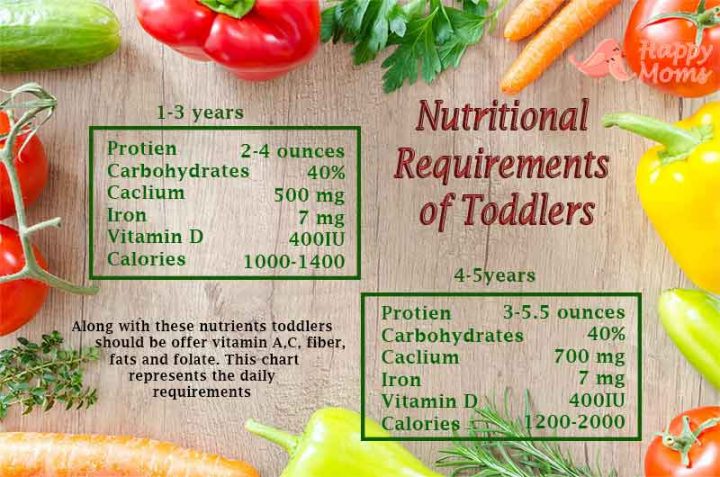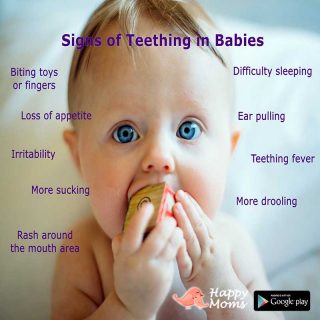
Nutritional needs for children are the same as for adults, however, they require different amounts of nutrients according to their age. Toddlers’ nutritional needs change with age and milestones they achieve.
Toddlers require a lesser number of calories as compared to infants, due to slowdown in their growth. The importance of nutrition for kids remains the same, and at every age, they require nutrients such as vitamins, minerals, carbohydrates, protein, iron, folate, and fat with a difference in quantity. Here are some details about nutrients for toddlers:
Protein
Protein is an important nutrient required to help maintain and repair body tissues and their growth. It also helps build-up of new cells, fight infections, breaking down of food into energy, carry oxygen and make enzymes to help control body functions. Major food that help increase protein in the body include seafood, meat and poultry, peas, beans, soy products, eggs, nuts, seeds, and dairy products.
Carbohydrates
Carbohydrates provide the most significant source of energy they aid the body to utilize fat and protein for building and repairing tissues. Sugar, starches, and fibers are the main source of carbohydrates; however, children should be given more of starch and fibers with less amount of sugar. A high level of carbohydrates can be found in breads, cereals, crackers, rice, potatoes, and pasta. Starch is also the main element of grains, cereals, root vegetables, and pulses. It is recommended that 40 % of the energy to a child should be provided through these foods by the age of 5 years.
Fats
Fats can easily be stored in a body and are a source of energy for children. They help the body to use other nutrients accurately, providing some of the fat-soluble vitamins such as vitamins A, D, and E. Children require more fat than adults as they require more energy with continuous growth and development. Food sources of fats include cooking oils, ghee, butter, nuts, meat, fish, and full-fat milk dairy products.
Calcium
Calcium is a vital nutrient that helps in building healthy bones and teeth. It’s also important for blood clotting and it helps in better functioning of the heart, muscles, and nerves. Children’s calcium requirement is more than adults as their bones are continuously developing. Good sources of calcium are; Cheese, milk, yogurt, cream, egg yolks, spinach, white beans, green beans, sweet potatoes, oranges, almonds, and figs. Toddlers aged 1 to 3 years require 500 mg while toddlers aged 4 to 5 years require 700 mg of calcium daily.
Get help from expert, upcoming workshop with child nutritionist Dr. Anam, where she will discuss about picky eaters, nutritional food, child immunity and you will receive FREE food chart for your child. Register here to join our workshop.
Iron
Iron is another essential nutrient that helps in building healthy blood which in turn transmits the oxygen to cells of the body. Iron deficiency can be caused in toddlers who are dependent on cow’s milk, as it is low in iron. It can cause behavioral and learning problems, anemia and also affect the growth in children. Toddlers require 7 mg of iron each day.
Foods that are rich in iron include meat, poultry, liver, fish, whole grains, dates, beans, iron-fortified cereals, nuts, and leafy green vegetables. It is important to give vitamin -C enriched foods with iron, as it helps in better absorption of iron in the stomach. Tomatoes, lemons, broccoli, oranges, and strawberries are a good source of Vitamin -C.
Fiber
Fiber is important to regulate bowel production in children; it helps prevent bowel disorders and constipation. Foods rich in fiber are bulky and can fill up the child’s tummy easily, and should be given in an appropriate proportion with other foods. Fiber-rich food includes whole-grain cereals, dates, figs, chickpeas, lentils, kidney beans, leafy green vegetables, seeds, and nuts.
Folate
Folate is one of the Vitamin-B, which is important for the growth and development of a cell in a body. The deficiency of folate can be a cause of anemia in children. High levels of folate can be found in whole-grain cereals, lentils, chickpeas, spinach, and black or kidney beans.
Vitamin A
Vitamin A helps in growth, improving eyesight and eye functioning, improves skin, and helps prevent infection. Foods that contain high levels of Vitamin A include carrots, squash, apricots, egg yolks, sweet potatoes, spinach, broccoli, cabbage.
Vitamin C
Vitamin C plays different roles as a nutrient, it not only helps to fight the common cold but also strengthens blood vessels, help in healing the wounds, build strong bones and teeth. Important food sources of vitamin C are tomatoes, lemons, oranges, strawberries, potatoes, melons, mangoes, papaya, cabbage, cauliflower, spinach, and broccoli.
Vitamin D
The human body naturally produces Vitamin D, through direct strong sunlight. Pakistani climate allows the direct exposure to the sunlight. It’s important to take care not to expose your child too much to the sunlight during summers, to avoid dehydration. Winters are the best time to expose your skin directly to the sun. Early hours of sunrise are a good source of vitamin D. UV rays are high from 10 am to 4 pm, proper care and sunblock should be used to protect the child’s skin.
Daily recommended vitamin D for toddlers is 400 IU. Vitamin D supplements can also be given to children on the doctor’s recommendation. Good food sources of vitamin D are milk, egg yolks, fortified cereals, and orange juice.

A comprehensive and balanced diet for your child is important for providing adequate levels of these nutrients. Offer your child a variety of foods as different foods contain different vitamins and minerals and help to form a balance among all nutrients.
Try to limit your child’s calorie intake, avoid added sugar from sources such as white and brown sugar, corn sweetener, honey, artificial, or junk food. It is also important to limit saturated fats and replace them with naturally occurring vegetable and nut oil, olives, avocados, and seafood. Toddlers do not need juices; it is recommended to limit the intake of juice to 6 ounces a day for children under 6 years of age. It is also important to give a limited amount of salt to avoid the risk of high blood pressure in older age. Avoid artificial foods with added salts.





Thanx for sharing this
Hope this helps u